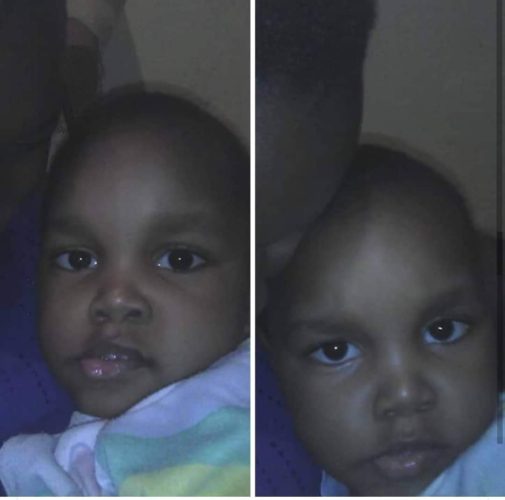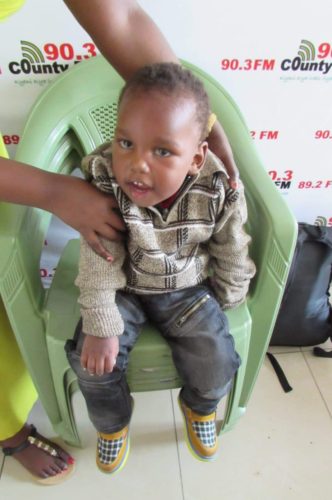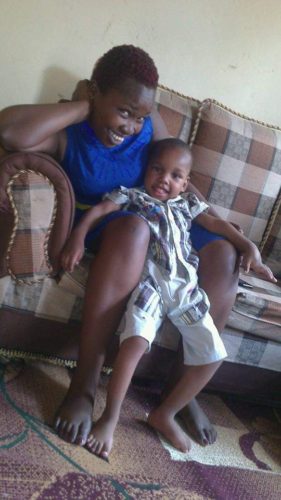Since 2014, she has been presenting the news in one of the vernacular languages of Kenya, Kikamba. Being a news anchor has been her dream since completing her education. It took a lot of blood, sweat and tears to get here. And along the way, she lost the most precious gift of all: her child.

In 2011, Zipporah Mwikali Ngwatu discovered she was pregnant and immediately informed the father of her baby. He advised her to abort the baby, but she refused.
Following a difficult pregnancy, her baby, Stephen, was born with the umbilical cord wrapped around his neck, twice.
“The lack of oxygen caused his brain to be affected,” Zipporah told The Weight She Carries. “He never cried and never breastfed.”
Soon afterwards, she was sent home; but she knew something was wrong. The following day, the baby started convulsing.
“His eyes were rolling back like he was dying and I rushed him back to the hospital where I had given birth to him. They said the baby had chest problems, yet he had difficulty breathing,” she said. “They wrote a referral letter to Kenyatta National Hospital (KNH).
The doctors at KNH were on strike, so Zipporah passed through Gertrude’s Hospital, at a place called Donholm in Nairobi, but found that the services were too expensive for her.
The baby was given First Aid and Zipporah was told to choose which other governmet hospital to take the baby to. She chose KNH and took the baby back to Kenyatta Hospital where he stayed for three weeks.
To treat his convulsions, Stephen needed therapy three days a week. The medication for convulsions was very expensive and his father would not contribute to the needs of the baby.
“I reported him to Childrens Offices, where he said he had insured his baby and he would take care of him. We told him to sign papers of commitment but he refused and we couldn’t force him. He then gave me an insurance card for the baby. We then took the boy to Nairobi Hospital as per him (the father),” she said. “At Nairobi Hospital we were told therapy should be five days in a week since the baby was late on doing some things like sitting.”
Zipporah insisted Stephen get therapy five days per week as advised, but Stephen’s father refused.
“He asked me whether therapy is food. We argued for some time, but he finally accepted. Unfortunately, the card got exhausted and baby’s health deteriorated and I reached out to the father again,” Zipporah said. “He said he warned me that I was to deal with it; he has no money for that.”
“Because the baby needed so much care, I resigned my job at a recording studio for gospel artists because I was being overworked. I worked from 6:30 a.m. until 3 a.m. If I was late by 2 minutes, that time would be deducted from my salary.” – Zipporah Mwikali Ngwatu
During the day, she needed a two-hour break from work to take her baby to therapy and then report back to work. Those two hours were also deducted from her pay.
“The therapy cost was Ksh 2,700 (USD $27) per session which shot to Ksh 3,000 later after the card was exhausted. My son’s doctor said there was a need to do a CT scan. I was told it will cost me Ksh 31,000 (USD $310) and I didn’t have the money to pay,” she said.
The convulsions continued to get worse. Zipporah was making Ksh 10,000 ($100) a month. Her employer said he could only give her a salary advance of Ksh 3,000 (USD $30). Since the baby wasn’t doing well, she decided to organize a fundraiser.

Due to her hectic work schedule, Zipporah was sleeping at the studio and leaving her baby home at night with her house maid. The workload was to intense to handle, so she quit.
“I told them that I was tired and that I was no longer going to work for them. I didn’t know where I was going to get money for my baby’s medicine or who was going to pay the house girl. I was left without a job, no man to stand by me, and no one to help me provide for my baby. I didn’t have friends and my family had exhausted their resources trying to help me take care of the baby. They asked if I had another job, I said, ‘No, but God will provide.’”
“I contemplated suicide several times, but I knew I couldn’t because who would take care of my baby? He could not do anything for himself. He couldn’t talk; he couldn’t sit. But he made me stronger.” – Zipporah Mwikali Ngwatu
Within three weeks, she had gotten a research job and was sent to Kitui, the place where she was born. It was a short-term position. Shortly afterwards, a friend called her and told her about a certain radio station being opened in Kitui County, Kenya.

Zipporah applied for the job and was shortlisted for an interview. During the interview she was told the job would not be hers because she could not present a program in Kikamba, which Zipporah wasn’t fluent in.
“I cried and the interviewing panel got shocked and they asked me why I was crying. I told them I want that job crazily. I told them I have a sick baby who needs care since he is sick and is on medication,” she said.
Wanting to be sure she was not making up the story, the panel asked Zipporah for proof that she was telling the truth.
“I told them I once did a feature story that is on YouTube. I gave them the link and they told me they will confirm and see what to do. Later, I was called and asked if I can work as a receptionist and I said yes. I had to move faster so as to ensure they don’t change their minds,” she said.
Zipporah left her son with the house girl in Nairobi and moved to Kitui, where she started work immediately. After three weeks, she went for her baby and house girl, sold all of their belongings in Nairobi and moved to start life with nothing but a borrowed mattress, and a second one from her rural home.
“While working reception, I would take time to get the newspapers translated to the Kamba language and carry my scripts home and train myself how to flow with it. With time, I felt I was good to go and requested to be given a chance to read news briefs. Permission was granted. So during the daytime, I would work as a receptionist, make tea and complete other duties, but after closing reception, I would walk to the newsroom and start preparing for briefs with the help of my colleagues.” – Zipporah Mwikali Ngwatu

With time, she was allowed to do a full bulletin. While she was progressing at work, her baby’s condition continued to cause concern.
“I was in a lot of debt since I had to get a private therapist on credit as I looked for money. I asked for help from the baby’s father but he gave me close to nothing,” she said.
After finding out that he had purchased a second vehicle from his friend despite claiming he had no money for the baby, Zipporah decided to file a case with FIDA, which advocates for women’s rights and helps ensure support is provided to women for their children.
“He was upset that I started court proceedings and I tried to explain to him that the money I would get from he was for the baby. He told me that if I didn’t withdraw my case, he would kill me,” she said. “He was served with the papers, but he never appeared in court.”
In 2016, Stephen’s condition deteriorated, and he passed away at just 4 years old. He died of kidney failure. The medicine caused his kidneys to deteriorate over time.
“I didn’t know at the time, so when the doctor told me why my baby died I asked why he would tell me to give the baby medicine that would destroy his kidneys. He said without the medicine, he would have died sooner,” Zipporah said.
“His father called my mother who confirmed the news. He asked if the baby should be buried at his family’s home or mine. He hadn’t seen his baby in years. Now that the baby was dead he wanted to be involved? He was nowhere to be found when I needed him to support the baby.” – Zipporah Mwikali Ngwatu
During the burial, Zipporah never cried. But when she went back to work, reality hit her and she became overcome by grief.
“I cried every day and could not stop. I found it so difficult to cope. Why did I have to go through this pain?” she questioned.
Seeking a means to numb the pain, Zipporah resorted to drinking heavily. With time, she came to terms with the loss.
“Every year when April comes, I struggle,” she said. “Some people tell me the only way to get over the pain is to have another baby. People who say that do not understand my pain or what I have gone through. Grief takes time. Healing doesn’t just happen immediately. At times you are strong, other times you lose it and cry a lot.”
For now, Zipporah is focusing on healing from the loss of her child. She advises other mothers who have lost children to be strong and to know that everything happens for a reason.
“I encourage them to talk about their children. Open up to that person who is willing to listen. It has really helped me. In the past I would narrate my story crying, but today I do it without a tear dropping for I have grown stronger by day,” she said.
“Most women I have seen who have children with special needs don’t have support because the fathers of the children have left. Sometimes they are even accusing the woman of witchcraft. I tell those women never to give up. Keep fighting for your babies until the end. There is no way God will let you go through all that hardship without a purpose.” – Zipporah Mwikali Ngwatu
If you have a story you would like to share with our readers, or know someone whose story will encourage others, contact us at info@theweightshecarries.com
Vimbai E. is a content marketer, ghostwriter, and the founder of The Weight She Carries. With hundreds of articles and stories publishing online, in print and for broadcast, her love of language and storytelling shines through every piece of writing that bears her name.


